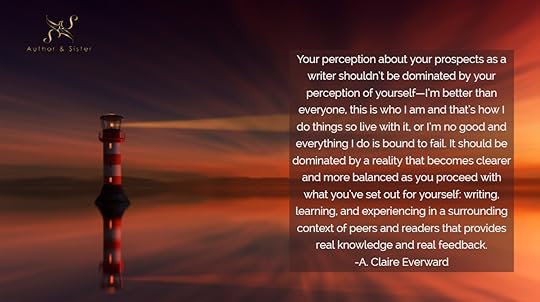Perception is a lot

Seventeen weeks after the first day of the second new year
And by perception author means the way in which you regard yourself, your capabilities, those of your peers, writers like you. Life. The world around you. Perception is important because it affects your morale, and your work.
An inaccurate perception of your abilities can be damaging. If you’re sure right from the outset that you’re a brilliant writer, that you’ve got it all down to a fine art, that you don’t need to know what readers want or need and that your work doesn’t need editing or reviewing or formatting because all that’s important is the brilliance of the story you’ve written and you’re the writer and everybody else’s job to understand you, if you think that you don’t need to go the length because it’s the readers’ job to come to you, then your perception of reality is way off. And, of course, inaccurate perception can go both ways. You might think that no matter what you do, you’re not good enough, that you will never measure up to the writers that you yourself like to read, that even after you gain experience and knowledge you won’t measure up to your peers, and, in fact, you’re not good enough to even master the skills needed—that’s the kind of perception that might come when you encounter difficulties on the way to writing your first book, or perhaps if the book you’ve published hasn’t received the feedback you’d hoped for.
Both these extremes of perception can impede your achievement of your goals. They could become an issue if you don’t learn from real experience, if you refuse to see that no matter how good a writer you might be, the work that makes your writing accessible to its readers must be done properly, or, conversely, that no matter the difficulties you encounter when you take your first steps to becoming a published author, you will get through them, just like everyone else does. Your perception about your prospects as a writer shouldn’t be dominated by your perception of yourself—I’m better than everyone, this is who I am and that’s how I do things so live with it, or I’m no good and everything I do is bound to fail. It should be dominated by a reality that becomes clearer and more balanced as you proceed with what you’ve set out for yourself: writing, learning, and experiencing in a surrounding context of peers and readers that provides real knowledge and real feedback.
Your perception of life, even before you become a writer, matters greatly, too. If you tend to think that the world is against you, that it’s unfair, that obstacles are purposely thrown in your way and that you are bound to encounter nothing but bad luck, that’s going to work against you. You will experience anger, futility, a perpetual sense of defeat—feelings that will do nothing but suck out all your energy and make you doubt yourself, while what you need to reach your goals is the kind of endurance that comes from optimism, from believing you can succeed. Nor would it help you to see the world in overly rosy colors, that bias too can impede your ability to assess what you encounter on the way and your reaction to it, as well as your ability to plan and prepare in advance for contingencies. And add to that that what you need when you write stories is a balance of feelings that allow you to walk in the shoes of your characters and perceive the situations they’re in with a balanced eye.
The reality is that the world has in it both good and bad. So does life. Bad things happen, and so do good things. Your part in it is doing the best you can and taking step after step forward toward your goals no matter what, while trying to maintain a level-headed approach. Yes, things will happen, some that you will perceive as bad—and others that you should recognize are good. And yes, you might well have times when you find it difficult not to react emotionally, perhaps extremely so. Just remember to come back from where you are when that happens, remember to regain a balanced perception.
Ultimately, what you do is your decision. But Author suggests that you remember that being a writer has inherent in it a whole lot of exposure—to your own feelings because of your need to immerse yourself in your characters’ lives, to the reactions of others around you—readers, family, friends, and to the reactions dictated by your personality as well as by your past experience, the life you’ve lived. So, once in a while, you would do well to take a step back, a virtual one, and try to see the picture of your life at that moment as a whole, it and your place in it, assess both, and see if your perception is anchored in reality. Doing so is not easy, of course it isn’t. But it’s a habit you should master. Author can say that it’s for your work, for your readers, and for the people who accompany you on this path you’ve chosen. But ultimately, it’s for you. It starts with you.
And just one more thing: a lot of our perception comes from our belief in ourselves. And that’s not easy, is it, gaining and maintaining that belief. That’s an important reason why Author reminds you now and then to appreciate the people who care about you, who believe in you. When your belief in yourself is low, when your perception of what you’re able to do and of how well you’re doing is impaired, it is their perception of you that can help you keep a grip on reality, keep the balance of your motions, keep you going.
Published on April 30, 2018 06:05
•
Tags:
author-perception, choose-the-right-perception, take-yourself-seriously
No comments have been added yet.



